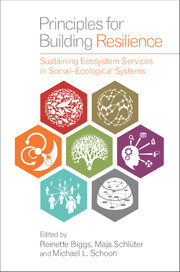Book contents
- Frontmatter
- Dedication
- Contents
- Acknowledgements
- Foreword
- List of contributors
- 1 An introduction to the resilience approach and principles to sustain ecosystem services in social–ecological systems
- 2 Politics and the resilience of ecosystem services
- 3 Principle 1 –Maintain diversity and redundancy
- 4 Principle 2 – Manage connectivity
- 5 Principle 3 –Manage slow variables and feedbacks
- 6 Principle 4 – Foster complex adaptive systems thinking
- 7 Principle 5 – Encourage learning
- 8 Principle 6 – Broaden participation
- 9 Principle 7 – Promote polycentric governance systems
- 10 Reflections on building resilience – interactions among principles and implications for governance
- Index
Foreword
Published online by Cambridge University Press: 05 May 2015
- Frontmatter
- Dedication
- Contents
- Acknowledgements
- Foreword
- List of contributors
- 1 An introduction to the resilience approach and principles to sustain ecosystem services in social–ecological systems
- 2 Politics and the resilience of ecosystem services
- 3 Principle 1 –Maintain diversity and redundancy
- 4 Principle 2 – Manage connectivity
- 5 Principle 3 –Manage slow variables and feedbacks
- 6 Principle 4 – Foster complex adaptive systems thinking
- 7 Principle 5 – Encourage learning
- 8 Principle 6 – Broaden participation
- 9 Principle 7 – Promote polycentric governance systems
- 10 Reflections on building resilience – interactions among principles and implications for governance
- Index
Summary
Why should we care at all about resilience? The biosphere – the sphere of life – is the living part of the outermost layer of our rocky planet, the part of the Earth's crust, waters and atmosphere where life dwells. It is the global ecological system integrating all living beings and their relationships. Humans are embedded parts of the biosphere and shape it, from local to global scales, from the past to the future. At the same time humans are fundamentally dependent on the capacity of the biosphere to sustain development. Humanity is indeed an embedded part of the biosphere shaping and reshaping its environment. In this sense humanity co-evolves with the planet and our beliefs, perceptions, choices and actions shape our future in the biosphere. Fundamental issues for humanity like democracy, health, poverty, inequality, power, human rights, security and peace all rest on the life-support capacity and resilience of the biosphere.
The situation of the Anthropocene – where the biosphere is shaped by humanity from local to global levels – reinforces that there are no ecosystems without people and no human development without support from the biosphere, hence, social–ecological systems. Humans and nature are truly intertwined and ecosystem services are critical for well-being. Analysing the world from historical, economic, geographical, ecological or other disciplinary approaches will provide bits of the puzzle. But, in the Anthropocene, the scale, speed and connectivity of human actions interact with the dynamics of the Earth system in new ways, which call for new understanding, new integrated approaches and collaborations across disciplines. Analysing situations of incremental change and assuming a stable environment is no longer the most fruitful way to understand the world and improve the human predicament. Viewing the world as a complex system is a more recent and promising approach that is emerging across the disciplines, including social and natural sciences as well as the humanities, and also the foundation of this book.
Reinette (Oonsie) Biggs, Maja Schlüter and Michael Schoon have done an excellent job pushing the frontier of sustainability science and resilience thinking by orchestrating the inspiring chapters of Principles for Building Resilience: Sustaining Ecosystem Services in Social–Ecological Systems into a coherent and significant book.
Information
- Type
- Chapter
- Information
- Principles for Building ResilienceSustaining Ecosystem Services in Social-Ecological Systems, pp. xix - xxiiPublisher: Cambridge University PressPrint publication year: 2015
Accessibility standard: Unknown
Why this information is here
This section outlines the accessibility features of this content - including support for screen readers, full keyboard navigation and high-contrast display options. This may not be relevant for you.Accessibility Information
- 1
- Cited by
